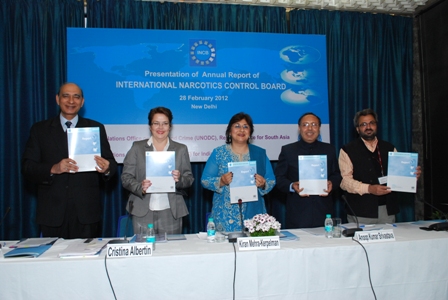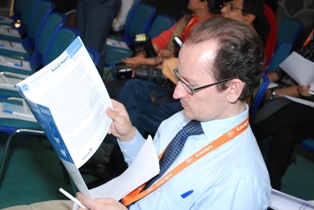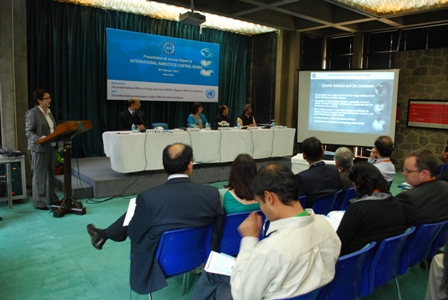South Asia: Presentation of the annual report of the International Narcotics Control Board (INCB) 2011

The United Nations Office on Drugs and Crime (UNODC) Regional Office for South Asia (ROSA) in collaboration with the United Nations Information Centre (UNIC) for India and Bhutan organized a media presentation of the 2011 Annual Report of the
International Narcotics Control Board (INCB) on 28 February 2011 in New Delhi, India. The presentation coincided with the release of the report at the INCB headquarters in Vienna.
 The INCB is an independent and quasi-judicial control organ established for monitoring the implementation of the United Nations international drug control Conventions[1]. Each year, the INCB prepares a report which analyses the drug control situation worldwide so that Governments are made aware of existing and potential situations that may endanger the objectives of the treaties. This year's report with the theme of 'Drugs and Social Cohesion' has highlighted how drug use and drug trafficking affects marginalised communities, leading to social disorder and exclusion. It emphasises the need for effective drug use prevention, treatment and rehabilitation services along with addressing the causes and meeting the needs of marginalized communities experiencing drug problems in a holistic manner.
The INCB is an independent and quasi-judicial control organ established for monitoring the implementation of the United Nations international drug control Conventions[1]. Each year, the INCB prepares a report which analyses the drug control situation worldwide so that Governments are made aware of existing and potential situations that may endanger the objectives of the treaties. This year's report with the theme of 'Drugs and Social Cohesion' has highlighted how drug use and drug trafficking affects marginalised communities, leading to social disorder and exclusion. It emphasises the need for effective drug use prevention, treatment and rehabilitation services along with addressing the causes and meeting the needs of marginalized communities experiencing drug problems in a holistic manner.
At the media presentation, Ms Kiran Mehra Kerpelman, Director UNIC, delivered the welcome address after which Ms
 Cristina Albertin, Representative UNODC ROSA, presented the salient features of the INCB 2011 report. She also gave an overview of the UNODC studies on the Afghan Opium Trade 2011 relevant to South Asia and the 'Misuse of Prescription Drugs' in the region. Thereafter, Mr. O.P.S. Malik, Director General, Narcotics Control Bureau, Government of India (GoI) delivered a statement on the drug trafficking trends observed in the country, the Government's steps to tackle them and the need for further research into emerging threats such as 'Designer precursors', which has been highlighted by the INCB 2011 Report. Mr Anoop Kumar Srivastava, Joint Secretary, Department of Revenue, GoI talked about India's recently released 'National Policy on Narcotic Drugs and Psychotropic Substances'. Finally, Mr T R Meena, Joint Secretary, Ministry of Social Justice and Empowerment, GoI gave an overview of the Ministry's initiatives to address drug demand reduction. This was followed by a discussion with the audience, which included representatives from the Government, Embassies, Civil Society and the media.
Cristina Albertin, Representative UNODC ROSA, presented the salient features of the INCB 2011 report. She also gave an overview of the UNODC studies on the Afghan Opium Trade 2011 relevant to South Asia and the 'Misuse of Prescription Drugs' in the region. Thereafter, Mr. O.P.S. Malik, Director General, Narcotics Control Bureau, Government of India (GoI) delivered a statement on the drug trafficking trends observed in the country, the Government's steps to tackle them and the need for further research into emerging threats such as 'Designer precursors', which has been highlighted by the INCB 2011 Report. Mr Anoop Kumar Srivastava, Joint Secretary, Department of Revenue, GoI talked about India's recently released 'National Policy on Narcotic Drugs and Psychotropic Substances'. Finally, Mr T R Meena, Joint Secretary, Ministry of Social Justice and Empowerment, GoI gave an overview of the Ministry's initiatives to address drug demand reduction. This was followed by a discussion with the audience, which included representatives from the Government, Embassies, Civil Society and the media.
According to the 2011 INCB report, the trends in South Asia are:
- Increasing problems with abuse of prescription drugs and over-the-counter pharmaceutical preparations containing narcotic drugs and psychotropic substances
- Often obtained through pharmacies that do not respect prescription requirements or through illegal Internet pharmacies
- Ongoing illicit manufacture and trafficking of amphetamine-type stimulants and their precursors
- Rising levels of injecting drug abuse contributing to an increase in HIV and hepatitis C infection rates
Click here to read the
INCB Report 2011 and
Press Kit
Click here to read the
'National Policy on Narcotic Drugs and Psychotropic Substances'
Click here to read media reports related to the INCB Launch:
Narcotics sourced through internet, social media: Report
Rise in Abuse of Over-the-Counter Drugs in India: UN
Social media used to sell drugs to youth, report says
[1] The Single Convention on Narcotic Drugs, 1961; The Convention on Psychotropic Substances of 1971; and the United Nations Convention against Illicit Traffic in Narcotic Drugs and Psychotropic Substances of 1988


